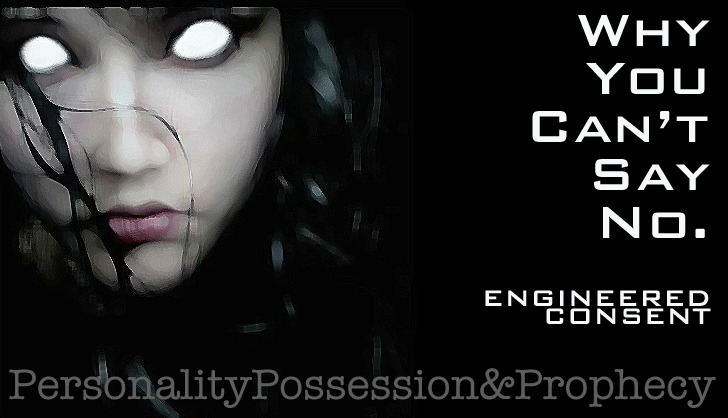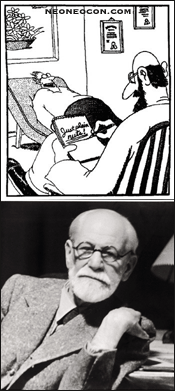

*Notes and references for this article.
Bernays Sells Psychoanalysis to America
 Bernays had a different solution for Freud. He had already benefited by implementing his uncle's theories in his successful marketing strategies. He helped Freud by publishing his books in English for the first time, then promoting them much as he had done for other products.
Bernays had a different solution for Freud. He had already benefited by implementing his uncle's theories in his successful marketing strategies. He helped Freud by publishing his books in English for the first time, then promoting them much as he had done for other products.
He planted articles in various magazines and newspapers, promoting psychoanalysis while at the same time condemning it. The controversy made people curious. He then promoted Sigmund Freud to such an extent that our motif of a psychiatrist, with beard and glasses, comes from Bernays' work.
It wasn't long before Freud and psychoanalysis became the vogue, especially in Boston and New York. America's rich and elite, who were not allowed to show their feelings in public, eagerly sought the opportunity to vent their emotions and explore their own egos. There were waiting lists for psychoanalysis and it was an acceptable "hobby" for many socialites.
Because of Bernays, psychoanalysis, with its emphasis on sex and animal instincts, has become the basic theory for our mental health practitioners. It is the kind of treatment you would get if, say, you went for therapy at a metropolitan hospital's clinic.
Psychoanalysis is a pessimistic theory in that it emphasizes man as little more than a smart animal. At the time Bernays was making the throne for Freud, other researchers were concentrating on man's higher inclinations. Roper and Gallup conducted surveys of large swaths of the American population. They asked people about everything. And they were discovering a bright side to human psychology, with altruism and love having importance.
At the time even Freud was having second thoughts about the popularity of his theory. He saw it misinterpreted and misunderstood -- but mostly he feared that the knowledge was being used for evil. In his last days, Freud wrote Civilization And Its Discontents, in which he claimed to have realized that civilization was not an evolutionary milestone, but a defense against the terrible evil inside men that must be controlled for survival.
Had this been widely known, more optimistic "theories of mind" might have taken root and displaced Freud's ideas. But fate was on Bernays' side. He had been noticed by the wealthiest manufacturing and banking families... and they had big plans for him.
The Elite Make Their Move
Just prior to the outbreak of WWII, the industrial revolution had resulted in a group of elite and wealthy families. Much of this wealth was invested in manufacturing and selling goods to the public. They owned the factories and the chain Department stores. They had already maximized profit from sales to people who needed their products -- but was that all there was?
The business leaders were keen on Bernays' methods. They knew what they wanted.
"We must shift America from a needs to a desires culture. People must be trained to desire to want new things even before the old has been entirely consumed. We must shape a new mentality in America. Man's desires must overshadow his needs."
-- Paul Mazer, Lehman Bros.
Well, as they say, the rest is history. No more utility. Products were going to be expressions of our inner unconscious feelings. Retail sales would be generated by creating the desire for the products -- the kind of ass-backwards scheme that persists as Bernays' legacy -- "it's not that you need it, but you will feel better with it."

These marketing strategies were so effective that the elite decided to use them in other areas of human life. Like Freud, those who knew the intimate details of psychoanalytic theory feared there was a danger that evil and violent behaviors could arise in the masses at any time. The riots in Russia and elsewhere were fresh in their minds. They had a sizable investment in the status quo and understood that the masses must be controlled.
This control would involve much more than selling cake mix. This would involve all aspects of human culture -- from religion and morality to government. Some even feared that democracy was a mistake. The public could not be trusted to make rational decisions or have opinions. ... especially opinions. Yes, they had to control opinions... lots of work for Bernays and his associates.
The Meaning of "Democracy" Changes
If you want to change people's personalities and control their irrational acts there is no better way than to legislate them. This meant that Bernays would have to use his methods in politics. To demonstrate the power that psychoanalytic theory could have over large populations, he took president Calvin Coolige on as a client.
 Coolige had succeeded president William Harding, who died in office. With two years under his belt, Coolige had an image problem that was going to sink his election. He was a sullen man and people joked that he resembled a wooden statue. Bernays was hired to change this image.
Coolige had succeeded president William Harding, who died in office. With two years under his belt, Coolige had an image problem that was going to sink his election. He was a sullen man and people joked that he resembled a wooden statue. Bernays was hired to change this image.
A number of staged "morning breakfast meetings" were arranged so that Coolige could meet with various celebrities and world figures. Al Jolson, Raymond Hitchcock, Ed Wynn, John Drew -- even the Zeigfeld Follies took part. The press loved it and the effect changed the public's opinion of Coolige, allowing him to serve four more years as president.
But wait... there's more!
Years later, Bernays took on the country of Guatemala and helped overthrow the regime so that United Fruit Company (Chiquita Brand), the leading grower of bananas in the world, could stay in business.
 You should recognize this one: He started referring to the regime, which was a socialist party that wanted to re-negotiate the plantation leases, as "Communists", saying that it was dangerous to have Communists "just a few hundred miles from our border".
You should recognize this one: He started referring to the regime, which was a socialist party that wanted to re-negotiate the plantation leases, as "Communists", saying that it was dangerous to have Communists "just a few hundred miles from our border".
In reality, Guatemala was neither Communist nor a threat to anyone except United Fruit Company. The company feared that concessions in Guatemala would have disastrous effects in other countries where they controlled everything. They wanted "business as usual".
Bernays tapped into the public's fear to persuade them with the repetition of his message ("Communists!"), having people regarded as "experts" claiming they were worried and that we should "do something", and constantly threatening that they were close to our border, as if they might attack.
Most people knew virtually nothing about the United Fruit Company, or where Guatemala was, the regime or, for that matter, Communism. The US government, reacting to the public's fears, secretly trained (CIA) and armed hundreds of "freedom fighters", bombed the Guatemala capitol and a new leader (affiliated with United Fruit Company) was installed.
Many lives have been lost in the name of corporate profits and market stability -- by manipulating our personality to both consent or remain silent in the face of such irrational decisions -- thanks again to Bernays.
The Nazi Party Supersizes Psychoanalysis
© Gary Vey for viewzone
